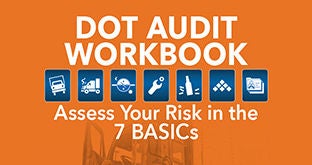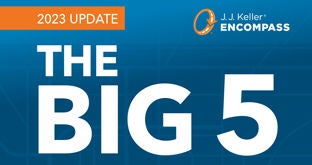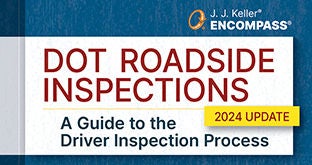Stay on top of vehicle legalization requirements and recordkeeping, including titling, registration, taxes, and permits with Encompass. Keeping proper documentation is essential and it's how you demonstrate your vehicles are legal.
Fleet Legalization
Improve Accuracy & Minimize Risk with Encompass
Fleet Legalization Made Easy
Encompass provides:
With Encompass, you centralize and streamline your vehicle legalization compliance efforts and minimize the risk of non-compliance, audits, and fines.
"Encompass keeps track of licensing for all our drivers and company vehicles. Whether I'm dealing with CMV drivers or non-CMV drivers, it's a great system."
Danielle Bodway
"Five years ago, we had a major DOT audit. With Encompass, we sailed through that audit better than we ever have before. What used to take 3-7 days took about 3 hours."
Neal Prichard
“I like knowing that J. J. Keller keeps up with regulations and I can trust them to give me fast and accurate information as the industry changes. It can be overwhelming to keep up with all the regulatory changes, but we can trust what J. J. Keller has to report and know that it's current.”
Melissa Alsman
- 1
- 2
- 3
FAQs
The total driver count is based on the number of drivers operating commercial motor vehicles (CMVs) on an average workday. In addition to regular drivers, the total includes part-time, casual, and leased drivers. Becuase operational needs can vary by season and from day to day, the expectation is simply to provide a picture of your operation from a “number of drivers” perspective. Once you determine the count of drivers on an average workday, enter this number first on the MCS-150. Then you can work backwards to enter how many drivers typically operate:
- Equipment that requires a commercial driver’s license (CDL);
- Within 100 air-miles of their normal work reporting location, that operate in:
- Interstate commerce, or
- Strictly intrastate commerce, and
- Outside of 100 air-miles from their normal work reporting location, that operate in:
- Interstate commerce or
- Strictly intrastate commerce.
Because the total number of drivers in an average workday is entered first, the total will equal all interstate plus all intrastate drivers. The total number of CDL drivers should be equal to or less than the total number of drivers.
The most common types of DOT authority include:
- Property for-hire carriers transport items owned by others for compensation.
- Passenger for-hire carriers transport people for compensation. The compensation can either be direct (like a fare to ride) or indirect (the transport fee is included as part of the overall service, such as a hotel shuttle).
- Household goods for-hire carriers are often referred to as movers. They transport household goods for the public in exchange for payment.
- Property brokers receive payments for arranging the transport of property belonging to others. A broker brings a buyer and a seller (a shipper and a carrier) together. A broker does not assume responsibility for the property and never takes possession of it.
- Freight forwarders provide transportation of property for compensation. In the ordinary course of business, they assemble, consolidate, and distribute the shipments – often using multiple carriers and modes. A freight forwarder assumes the responsibility for the transportation from the place of receipt to the destination.
IFTA and IRP treat lease agreements differently. IRP allows the responsibility to reside with either party — the owner-operator or the motor carrier. The written lease agreement must specify which party will be the registrant. With IFTA, the length of the lease is the deciding factor in responsibility. When the lease is long-term (30 days or more), either the owner-operator or the motor carrier can take responsibility. If liability and responsibility for IFTA are not specified in the lease agreement, the vehicle operator will be liable. In short-term leases (29 days or less), the owner-operator takes on IFTA responsibility.
FMCSA requires that vehicle markings include the company’s legal name, the letters “USDOT,” and the company’s USDOT number. In lieu of the legal name, the carrier’s tradename or doing business as (DBA) name can be displayed if it was included on the MCS-150 registration.
Build Your Compliance Knowledge
Expand your safety library with free J. J. Keller resources. Over 200 years of collective experience and education — that's the J. J. Keller difference.

DOT Audit Digital Workbook
This eBook will help you determine your fleet's regulatory risk using the FMCSA's Safety Management Cycle.

The Big 5: Your Road Map for a Strong FMCSA Compliance Program
The FMCSA rules are complex and time-consuming. This eBook offers best practices and solutions related to the top 5 compliance areas.

DOT Roadside Inspections: A Guide to the Driver Inspection Process
Prepare your drivers for roadside inspections with this comprehensive eBook created by J. J. Keller regulatory experts.
Thank You!
A J. J. Keller representative will contact you soon, or you can contact us at 855-693-5338.